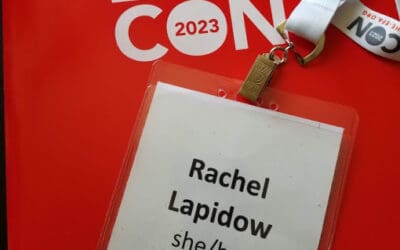Editor’s note: This is a guest post by editorial professional Molly Rookwood.
LitHub recently published an article purportedly written by a copyeditor who argued, confoundingly, against copyediting. “Against Copyediting: Is It Time to Abolish the Department of Corrections?”, written by Helen Betya Rubinstein, claims that copyediting is stodgy, stuck in the past, and based in white supremacy. Rubinstein promotes, instead, a type of editing that works with the author’s style and acknowledges the changing landscape of language.
Friends, that’s called copyediting.
Rubinstein’s arguments made me, along with many of my editorial colleagues, furious. Our profession had been besmirched, and writers were being told by an editing professional (I’m itching to put “professional” in quotation marks) that copyediting is not something they need.

Writers, in my experience, are often nervous about the editorial process. They’re concerned that the editor is going to red-pen away their authorial voice, turns of phrase of which they are especially fond. They might be worried that an editor won’t know their dialect and will incorrectly assume something is a mistake.
It means so much to me when, at the end of a copyedit, my writers tell me that I put their fears to rest, that they feel so much better about their book now, that the copyedit has helped their words match their authorial vision.
I view it as part of my job to alleviate my writers’ fears. And so, in response to the very bad, misleading, and frankly irresponsible LitHub article linked above, here are some things that copyediting is not.
1. Copyediting does NOT work against the author.
As an editor, my goal is to help the author’s voice and style shine through, not to remove the writer in favor of some objective, “more correct” version.
Rubinstein made it sound like copyeditors crow over mistakes, vindictively searching for errors to strike out in red. This is wrong.
Yes, I am looking for errors when I copyedit, but only because my job is to make the author’s writing as clear and consistent as possible.
The first and foremost rule I learned in publishing school was to do no harm. This meant that we should never introduce new errors to a piece of writing through carelessness, but it also meant that we should never assume something is a mistake just because it doesn’t feel right to us. If I’m not sure something is correct, I do my research and/or query the author to find out if it was intentional. I do not exert legislative power to tell them that their words are wrong.

2. Copyediting is NOT stuck in the past with outdated rules of language.
The editors I know work hard to stay up-to-date with current language usage, and we edit accordingly. Professional development is extremely important in the editorial field, and we take courses, attend presentations and conferences, and read books about the changing field of language.
In September 2022, I attended (and then wrote about) the online ACES conference, and I’d say that almost half of the presentations were about editing sensitively and inclusively in today’s landscape. Among the presentations were “Editing for Bias,” “Editing Gender,” “Editing Without Tears,” and “Ethical Editing: How to Follow, Break, and Change the Rules.” None of these presentations felt even remotely stuck in the past.
Descriptivist vs. Prescriptivist Editing
Good copyeditors use descriptivist editing (editing that is based on the current usage of language) rather than prescriptivist (like Strunk & White).
I don’t know why so many writing programs still assign The Elements of Style. While it was indeed held up for many years as the pinnacle of grammar rules, the book is an entirely prescriptivist endeavor. Strunk and White tell you there are definitive rules of language and you should not deviate from them. They’ll tell you that singular “they” is not allowed and that you should use “he or she” instead.
Editors have long ago moved past the idea that there is one correct set of writing rules. The goal of editing (and writing) is clear communication, and clear communication is dependent on the current use of language. Strictly enforcing the use of “whom” in a fantasy novel is not in service of clear communication. And replacing “they” with “he or she” is doing harm.
The editors I know and work with use the descriptivist method because it allows us to help our writers connect most effectively with their audience. It acknowledges the evolution of language and keeps our field from becoming, as Rubinstein suggested, stodgy and outdated.

3. Copyediting is NOT based in white supremacism.
One big problem with prescriptivist books like The Elements of Style is that they promote the idea that there is a “correct” English—namely, the elitist, formally educated, primarily white Oxford/Cambridge dialect.
I can see the argument that copyediting has roots in white supremacy if the editor in question follows a strictly prescriptivist method. If an editor rejects the evolution of language (which would be an absurd choice), then yes, they risk upholding a system that does harm.
There is a horrible history of the English language being used in colonialist and genocidal ways. (“Genocidal” here refers to stripping a people of their culture until that culture no longer exists, rather than the more common definition that refers to murder.) In Canada, Indigenous children were placed in residential schools and forced to speak “correct” English instead of their own languages. Today, children who grow up in minority cultures are often taught that their dialects are “wrong” and that they need to adopt the more official version of the language.
The system we use to teach writing can be colonialist, genocidal, and based in white supremacy. It is our job as editors to address the harm that has been done and do what we can to rectify that harm.
Good copyeditors recognize that dialects like AAVE have their own grammar structures and word spellings. In order to be good editors, we must learn to recognize when a writer is intentionally deviating from Oxford/Cambridge English. We must learn the correct way to edit different dialects, or find someone else who is better equipped to work with that writer.
Copyediting is a thoughtful and caring process.
Editors found their careers for a reason (and I promise, it was not for the money). We love language and its evolution, and we are not fighting it.
When I work with an author, I am on their team, not playing as their opposition. I don’t count mistakes as points against them. I am not removing their voice and supplanting their style with my own.
A good copyeditor wants writers to succeed. We want their voices to shine through as beautifully as it can. We want their stylistic choices to remain, and we want to help them convey their ideas to readers in the most effective way possible.
Editing is beautiful, caring, creative, and uplifting. It is fulfilling, collaborative, and difficult. Editing will always be a necessary part of the writing process, and the written world is a better place because of that.
Molly Rookwood
 Molly Rookwood is a freelance editor and writer based in Halifax, Nova Scotia. She studied publishing at Toronto Metropolitan University, after which she founded her company, Rookwood Editing. Molly works with fantasy, science fiction, and romance writers, and she is passionate about the role of editing in the writing process.
Twitter: @RookwoodEditing
Mastodon: @RookwoodEditing@Writing.Exchange
Molly Rookwood is a freelance editor and writer based in Halifax, Nova Scotia. She studied publishing at Toronto Metropolitan University, after which she founded her company, Rookwood Editing. Molly works with fantasy, science fiction, and romance writers, and she is passionate about the role of editing in the writing process.
Twitter: @RookwoodEditing
Mastodon: @RookwoodEditing@Writing.Exchange


